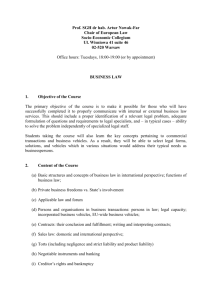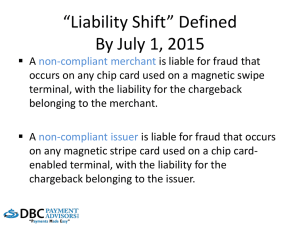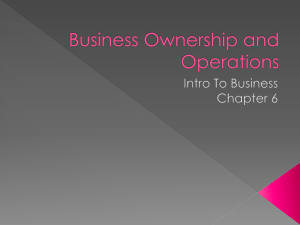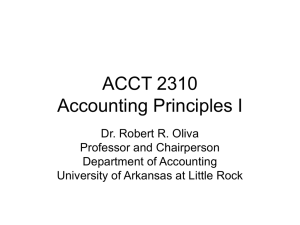Basic Legal Considerations for Starting a Business in Ontario
advertisement
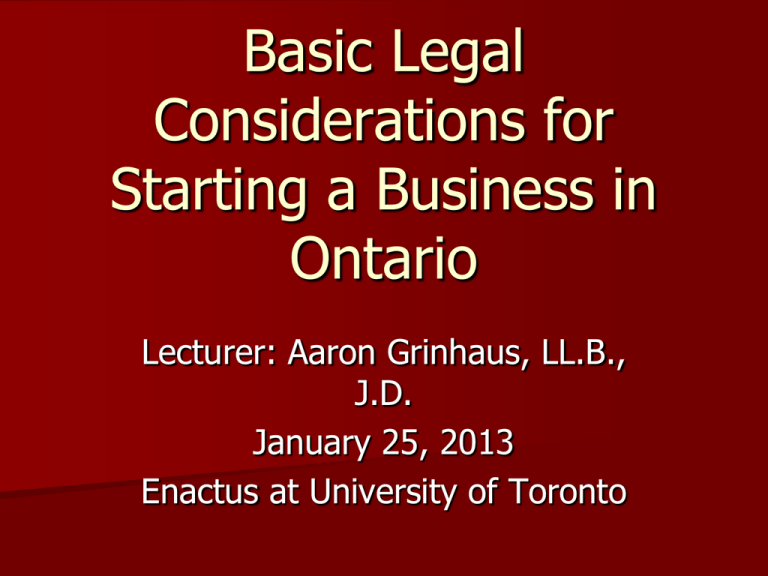
Basic Legal Considerations for Starting a Business in Ontario Lecturer: Aaron Grinhaus, LL.B., J.D. January 25, 2013 Enactus at University of Toronto In the Beginning... 1) Making sure you can operate legally 2) Knowing you have cash flow 3) Keeping costs low and profit high * Not-for-Profit and Charitable will not be covered in this lecture Basic Legal Considerations: Overview 1) Business vehicles to choose from 2) Liability and protection 3) Guaranties 4) Regulated Industries Basic Legal Considerations: Overview Depending on industry, what will your business will require? Are you in a regulated industry? Contracts: Service agreements, nondisclosure agreements, confidentiality agreements, contracting agreements – Will help you get paid and clarify the parties' obligations Basic Legal Considerations: Overview Websites: Copyright, terms of use, privacy policy Advertising and Marketing: Originality Protecting your Products (Intellectual Property) – Patent – Copyright – Trademark Business Vehicles What are your options? – – – – Corporation Sole Proprietorship Partnership Joint venture What are the differences? Business Vehicles: Sole Proprietorships Business Names Act, RSO 1990, c B.17 Very simple: business name and Master Business License Advantages: inexpensive to set up; all control and profits are yours; deductibility of losses Disadvantages: personally liable for all debts; taxed at individual rate (higher than corporate rate); business relies entirely on one person Business Vehicles: Partnerships Partnerships Act, R.S.O. 1990, c. P.5 – General Partnerships – Limited Liability Partnerships Limited Partnerships Act, R.S.O. 1990, c. L.16 Business Vehicles: Partnerships Advantages: – Cost sharing; easy to start (little required other than registration of name and partner names, can be done online); inexpensive; partnership agreement very flexible; loss and profit sharing Business Vehicles: Partnerships Disadvantages: – Partners personally liable for debts of company (LP and LLP have limitations on this) – Hard to find good partners – Tax liability for partners can be high; taxed at individual rate – No protection from commercial or other legal liability Business Vehicles: Corporations Corporations: Business Corporations Act, RSO 1990, c B.16 Advantages – – – – – – Separate legal entity (Limited liability) Lives forever until dissolved Can divide Equity Share Capital is Transferrable Shareholder Agreements Low tax rate; QSBC\CCPC is %15 Business Vehicles: Corporations Disadvantages – Heavily regulated – Expensive to set up and maintain Onerous record and documentation requirements – – – – Separate tax return "Piercing the Corporate Veil" (e.g. Director and Officer Liability) Residency requirements of directors Without Shareholder Agreement, conflict can arise Oppression; litigation Legal Considerations When Setting Up a Business Federal\Provincial incorporation Liability: commercial and otherwise Ongoing costs in administering Local, provincial and federal regulations Tax Legal Considerations When Setting Up a Business What do you need protection from? – Contracts – Law suits – Debt What types of risks are you exposing yourself to? – Professional liability – Injury – Commercial Disputes Tax Considerations – Legal Perspective What taxes will you be liable for? – Excise Tax (HST) Charged on most goods and services unless exempt Excise Tax Act, RSC 1985, c E-15 – Income Tax Capital vs. Current Income Income Tax Act, RSC 1985, c 1 (5th Supp) Tax Considerations – Legal Perspective Tax collection and remittance – Obligation of Business Crown Trust Money: Personal Liability of Proprietors and Directors – Source deductions from payroll – HST from customers Tax Considerations – Legal Perspective Minimizing your tax liability: Structuring – Depending on business vehicle can structure in different ways to reduce tax liability – Income Splitting: Family members\trusted individuals\Partners – Tax deferral: “Rollovers” – Tax minimization: Deductions – Capital Gains Exemption (Sale) – Trusts Planning for an Exit Debt Retirement Sale Succession Planning for an Exit Debt – Bankruptcy – Are you personally liable to bank, outstanding tax Retirement – With debt: handing “keys to the bank” Sale – Corporate or partnership\sole prop interest? – Share sale or asset sale Succession – Handing over to family members; structure is key I WISH YOU SUCCESS! THANK YOU QUESTIONS? Contact info: aaron@grinhaus.ca www.grinhaus.ca
